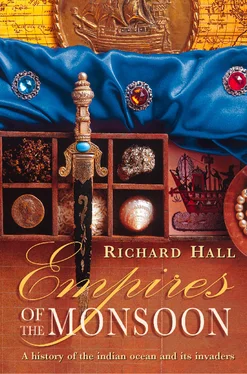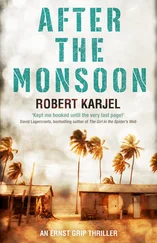Following this series of disasters, Ibn Battuta abandoned all thought of going to China for some years. Instead, he travelled aimlessly about southern India and Ceylon, attaching himself as the opportunity arose to various Muslim, Hindu and Buddhist rulers. He was repelled by the lawlessness he encountered on both land and sea, and by the cruelties inflicted upon men, women and children alike. But this way of life offered many possibilities for someone of his experience and with his gift for seizing the opportune moment.
At times the situations he encountered could be almost too demanding, as happened when he visited the Maldive islands, lying several days by sea to the south-west of the Indian mainland. These hundreds of coral outcrops, with their palm-trees and sandy beaches, would have reminded him of the islands off the African coast. The Maldives were prosperous, partly because of a seemingly endless supply of cowrie shells lying in shallow water off the beaches: for many centuries the shells had been exported to northern China to be used as currency, and shiploads were sent in the opposite direction every year to Africa for the same purpose. 5
Islam’s roots were not deep here, the faith having been introduced by a visitor from Persia in 1153; before that the population had followed a mixture of Hinduism and Buddhism. Ibn Battuta claims that he tried to disguise his identity on arrival, through a fear that the Maldivian rulers might prove loath to let him leave again, because they lacked a qualified Muslim law-giver. He was quickly recognized none the less: ‘Some busybody had written telling them about me and that I had been qadi in Delhi.’ The suspicion that, in truth, he was only too ready to be asked to offer his services is hard to avoid.
Presents were soon being showered upon him by the Maldivian chief minister and other notables: two new slave-girls, silk robes, a casket of jewels, five sheep and 100,000 cowries. Soon the highly-prized Moroccan finds himself being offered wives from among the rival ruling families, and accepts four, the most a good Muslim can have at any one time. In all, during his eight months in the Maldives he had six different wives. This was entirely in accord with the custom of the islanders: ‘When ships arrive, the crews marry wives, and when they are about to sail they divorce them. It is really a sort of temporary marriage.’
Given little option, Ibn Battuta soon donned his robes as the islands’ chief justice and set about his duties with a will. His interpretation of the shari’a law was much stricter than anything the easy-going islanders had been used to. When he sentenced a thief to have his hand cut off, several people fainted in the courtroom. Anyone who was found to have been absent from Friday prayers was beaten and paraded through the streets. Husbands who kept divorced wives with them until they found new husbands were also beaten. Only one edict by the strict new judge came to nothing: he tried to stop the women walking around bare-breasted, ‘but I could not manage that.’
If Ibn Battuta had set out deliberately to make himself unpopular and stir up rival factions, so easing his departure, then he was successful. The breaking point came when he ordered that an African slave belonging to the sultan should be beaten for adultery; he then publicly rejected the chief minister’s appeal for the order to be rescinded. Even this did not remove all obstacles to his departure, for there was now a suspicion that when he returned to the Indian mainland he might incite potential enemies there to amount an invasion of the islands. (Such fears were justified, for as Ibn Battuta admits – or rather, boasts – he became immersed in intrigue and later came close to mounting just such an attack.) Eventually, he agreed to make a tour of the islands while emotions cooled. Then he went to say farewell to the chief minister: ‘He embraced me, and wept so copiously that his tears dropped on my feet.’
A leisurely voyage through the Maldives gave the embattled qadi time to collect material for the earliest surviving description of the islands. At last he reached an islet where there was only one house, occupied by a weaver:
He had a wife and family, a few coco-palms and a small boat, with which he used to fish and to cross over to any of the islands he wished to visit. His island contained also a few banana trees, but we saw no land birds on it except two ravens, which came out to us on our arrival, and circled above our vessel. And I swear I envied that man, and wished that the island had been mine, that I might have made it my retreat until the inevitable hour should befall me.
Ibn Battuta eventually slipped away from the Maldives after divorcing all his four current wives (one was pregnant). However, he kept his slaves. His ship sailed off-course and put into harbour in Ceylon, instead of reaching the coast of India. So he took the opportunity to collect facts about the island, noting among other things that the most powerful man in the large town of Kalanbu (Colombo) was a pirate named Jalasti, with a force of 500 Abyssinian mercenaries.
The wandering judge was tempted to Adam’s Peak, a place of pilgrimage for Muslims, Buddhists and Christians alike. At the top was a depression claimed to be the footprint of the first man, and to reach it the pilgrims had to go up a steep stairway with the aid of chains fixed to the rock. Marco Polo had also described Adam’s Peak, but Ibn Battuta’s account of struggling to the mountain-top has infinitely more drama. As he stared down from the peak through the clouds to the vivid greenery of Ceylon he remembered that he had been away from his Moroccan homeland for almost twenty years, but he was still little more than halfway to China, the ultimate goal. There was also a lingering sense of duty towards that self-styled ‘Master of the World’, the mad sultan in distant Delhi.
The route Ibn Battuta took to get to China was typically circuitous. First he made his way up the eastern coastline of India, almost being shipwrecked at one point and risking his life to rescue his slave-girls. He even dared to return to the Maldive islands, contemplating taking away his two-year-old son by the senior wife he divorced there, but soon thought better of it and sailed to Bengal – a ‘gloomy’ country where food was cheap. Next he went to Assam to meet a holy man, then arrived in Sumatra, where he stayed with a Muslim ruler and clearly felt far more at ease than Marco Polo had done during his time in the same land. Finally he landed in the port of Zayton and immediately had the luck to meet one of the Chinese ambassadors who had come to Delhi with presents from the Great Khan.
Although Ibn Battuta strives to convey the idea that he was at once elevated to the status of a visiting ambassador, and was taken in magnificent style to see the Great Khan at Peking, this part of Ibn Battuta’s memoirs lacks the vivacity of the rest. He does admit that he never saw the Mongol ruler, saying that this was because of a rebellion spreading disorder throughout north China. For all that, he is able to give a convincing account of the burial of the deposed monarch with a hundred relatives and confidants, ending with a grisly description of horses being slaughtered and suspended on stakes above the graves. 6
Ibn Battuta was constantly impressed by the wonders of China, but unlike Marco Polo he did not enjoy life there: ‘Whenever I went out of my house I used to see any number of disagreeable things, and that disturbed me so much that I used to keep indoors and go out only in case of necessity. When I met Muslims in China I always felt as though I was meeting my own faith and kin.’ The nub of his unease lay in being totally outside the Bilad al-Islam , and discovering that ‘heathendom had so strong a hold’ in what was plainly the most powerful country in the world.
Читать дальше












